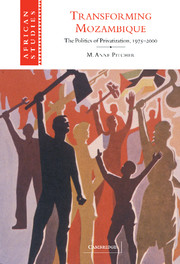Book contents
- Frontmatter
- Contents
- List of figures
- Preface
- List of abbreviations and acronyms
- Glossary
- Map
- Introduction
- 1 The reconfiguration of the interventionist state after independence
- 2 Demiurge ascending: high modernism and the making of Mozambique
- 3 State sector erosion and the turn to the market
- 4 A privatizing state or a statist privatization?
- 5 Continuities and discontinuities in manufacturing
- 6 Capital and countryside after structural adjustment
- 7 The end of Marx and the beginning of the market? Rhetorical efforts to legitimate transformative preservation
- Bibliography
- Index
- OTHER BOOKS IN THE SERIES
3 - State sector erosion and the turn to the market
Published online by Cambridge University Press: 22 September 2009
- Frontmatter
- Contents
- List of figures
- Preface
- List of abbreviations and acronyms
- Glossary
- Map
- Introduction
- 1 The reconfiguration of the interventionist state after independence
- 2 Demiurge ascending: high modernism and the making of Mozambique
- 3 State sector erosion and the turn to the market
- 4 A privatizing state or a statist privatization?
- 5 Continuities and discontinuities in manufacturing
- 6 Capital and countryside after structural adjustment
- 7 The end of Marx and the beginning of the market? Rhetorical efforts to legitimate transformative preservation
- Bibliography
- Index
- OTHER BOOKS IN THE SERIES
Summary
The state must involve itself with large development projects and the major social sectors of education, health, housing, and justice…. the state should not sell matches.
President Samora MachelHow can we want to manage hotels like the Polana and the Dom Carlos … when we don't even know how to manage our own kitchens?
President Samora MachelTwo periods of economic and political reform have characterized the years since 1983 in Mozambique. The erosion of the state sector constituted the first period from approximately 1983 to 1990, while the transition to private ownership and a market economy after 1990 define the second period. In his study of regime change in transitional countries, Róna-Tas argues that what differentiates the two periods is the source of the change. In the first period, “self-interested individuals pursuing private gain” initiate state sector erosion from below. In the second period, the state generates the transition to capitalism from above primarily “through decisive legislative action with the explicit purpose of creating a market economy.” I adopt Róna-Tas' approach to explain changes in Mozambique's political economy after 1983. The division into two periods is explanatory: it reveals more clearly the sequencing of the reform measures, and it exposes the social pressures that both prompted and frustrated the reforms.
The emphasis in this chapter on social pressures and reform sequencing differs markedly from explanations of events in the 1980s offered by government officials and some scholars.
- Type
- Chapter
- Information
- Transforming MozambiqueThe Politics of Privatization, 1975–2000, pp. 101 - 139Publisher: Cambridge University PressPrint publication year: 2002



